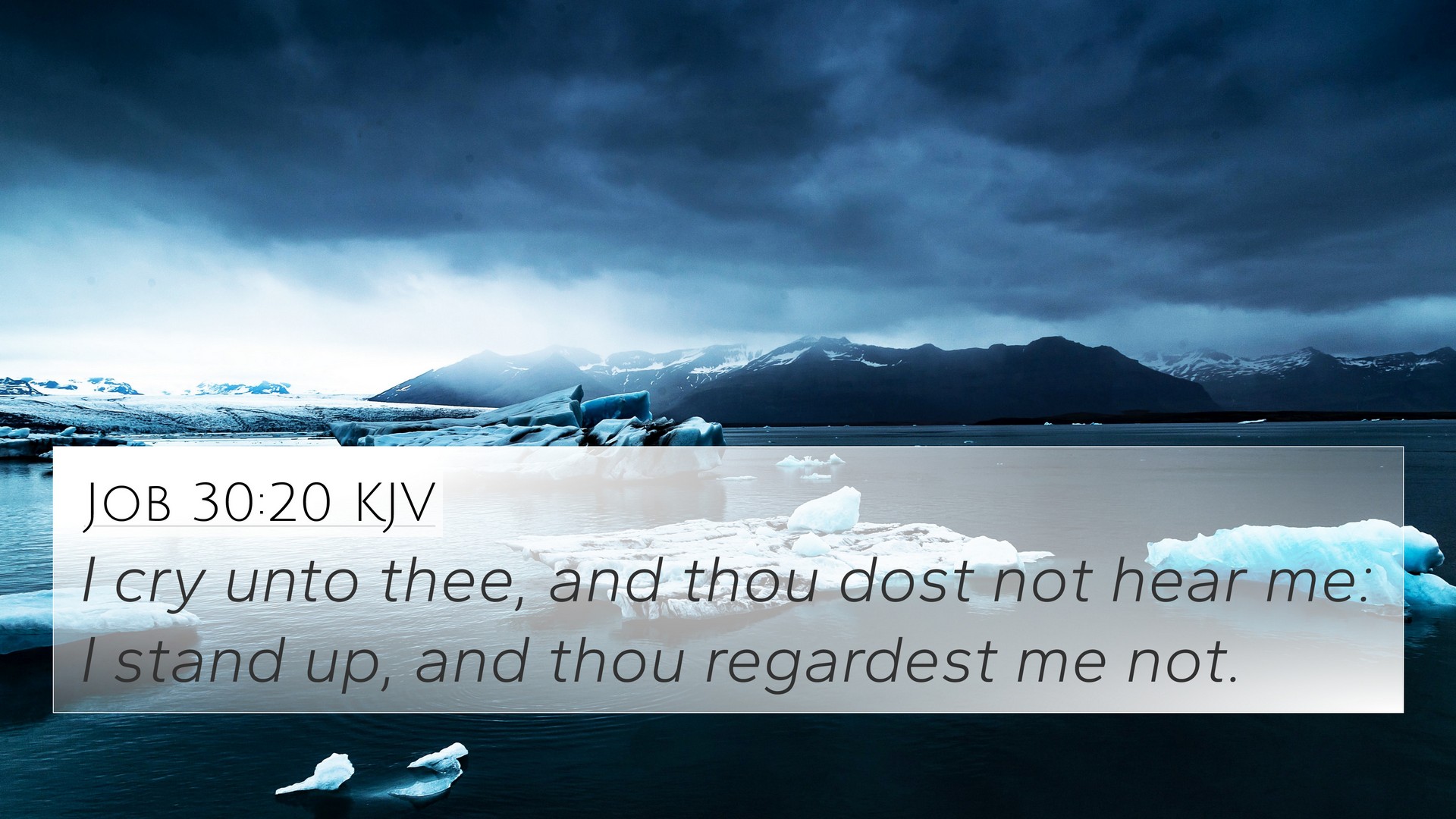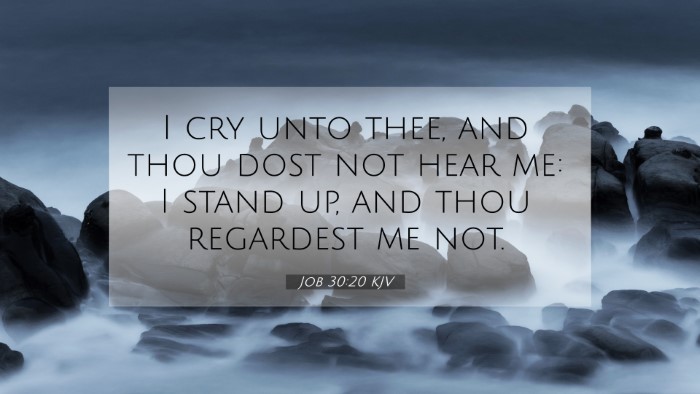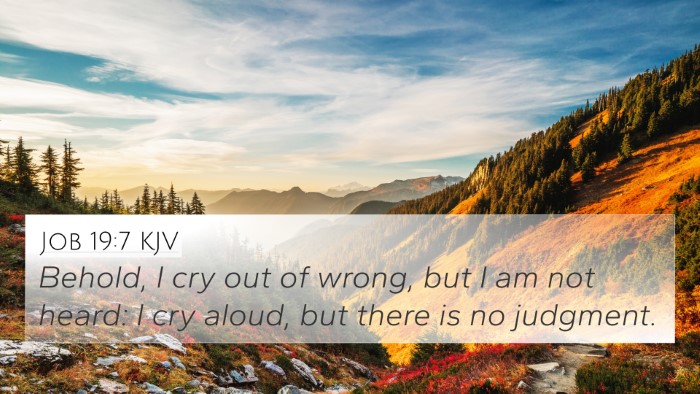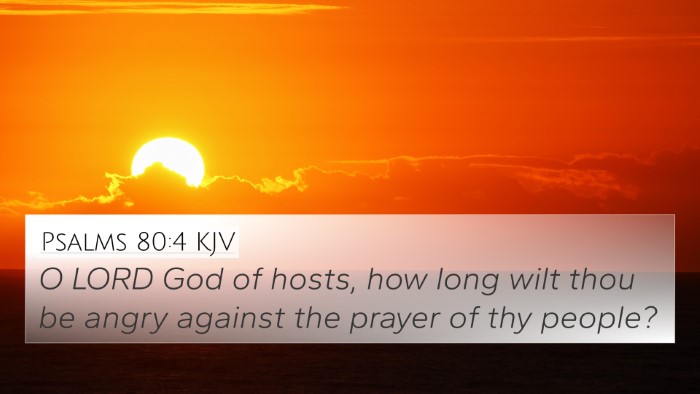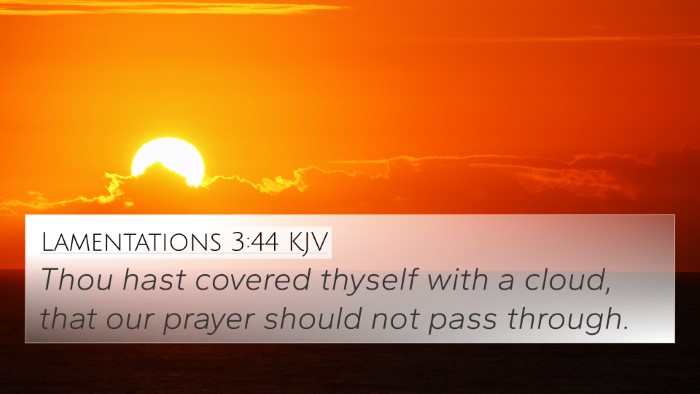Understanding Job 30:20
Job 30:20 states: "I cry out to You, God, but You do not answer; I stand up, but You merely look at me." This verse encapsulates Job's deep despair and feeling of abandonment during his suffering. To fully grasp its meaning, we can explore insights from renowned public domain commentators such as Matthew Henry, Albert Barnes, and Adam Clarke, who each offer valuable perspectives.
Contextual Analysis
Job, a man of integrity, experiences immense suffering. His cries to God reflect a crucial moment in his dialogue with the Almighty. The emotional weight behind this verse highlights not just Job's feelings of isolation but also poses profound theological questions about the nature of suffering and God's perceived silence.
Matthew Henry's Commentary
According to Matthew Henry, this verse expresses Job's agony and desperation. He notes that Job feels abandoned, emphasizing that Job was persistent in his prayers yet felt unheard. Henry points to the importance of acknowledging that divine silence does not imply absence. Instead, it's a call for faith during trials.
Albert Barnes' Perspective
Albert Barnes reflects on the theme of communication with God, indicating that Job's loud cries did not yield a response. He suggests that God's apparent silence can be understood as a test of faith, reinforcing the notion that believers may endure periods of spiritual drought despite their earnest supplications.
Adam Clarke's Insights
Adam Clarke expands on this idea, interpreting Job's feeling of being looked at without engagement as a daunting experience. Clarke emphasizes God's omnipresence, stating that though Job feels distanced, God remains aware of every detail of human plight. This acknowledgment brings about a deeper understanding of God's nature during suffering.
Thematic Connections
Job 30:20 connects to several themes prevalent throughout scripture, particularly concerning suffering, faith, and divine silence. Below, we explore cross-references that highlight these themes:
- Psalms 22:1: "My God, my God, why have you abandoned me?" - A parallel of feeling forsaken in moments of distress.
- Psalms 77:1: "I cried out to God for help; I cried out to God to hear me." - Exemplifies the earnest cry for divine attention.
- Isaiah 45:15: "Truly you are a God who has been hiding himself..." - References God's hiddenness during distressing situations.
- Matthew 27:46: "My God, my God, why have you forsaken me?" - Jesus echoes Job's cry from the cross, highlighting the weight of abandonment.
- Romans 8:28: "And we know that in all things God works for the good of those who love him..." - A reminder that apparent silence may serve a greater purpose.
- Hebrews 10:30: "It is mine to avenge; I will repay..." - A reassurance of God's justice and timing, even when he seems silent.
- 1 Peter 5:7: "Cast all your anxiety on him because he cares for you." - Encourages believers to trust in God's care, even when they feel unheard.
Connecting Themes Across Scriptures
The connections between these verses exemplify the pervasive theme of feeling abandoned or unheard by God, yet reminding us that faith must stand firm through trials. Such cross-referencing serves as a holistic approach to understanding biblical themes of suffering and God's nature during difficult times.
Tools for Cross-Referencing
When delving into the complexities of biblical texts, utilizing tools for cross-referencing can greatly enhance understanding:
- Bible Concordance: A comprehensive resource to locate specific verses and their relational contexts.
- Cross-Reference Bible Guides: These offer curated verses that share themes, providing deeper insights.
- Cross-Reference Bible Study Methods: Techniques to weave disparate verses into thematic studies enhance comprehensive understanding.
Inter-Biblical Dialogue
Engaging in comparative Bible verse analysis draws connections not only within Job's narrative but through the wider biblical corpus. It opens pathways for understanding how Old Testament themes resonate within New Testament teachings and vice versa. This method underscores the unity and continuity of scripture, as believers can discover intricate dialogues that emerge through such cross-referencing.
Conclusion
Job 30:20 encapsulates a profound emotional and spiritual truth that resonates through various scriptural texts. Understanding this verse through the lenses of historical and contemporary commentary enriches our perception of suffering and divine silence. By engaging with biblical cross-references, believers can cultivate a deeper faith and understanding amidst their trials.
